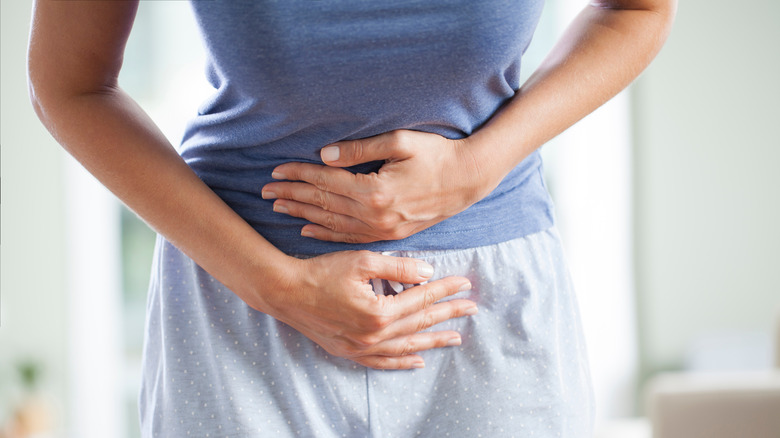Here's How Long Crohn's Flare-Ups Typically Last
A Crohn's flare-up can be extremely painful. So much so, that on days when symptoms are most severe, it can affect one's ability to function as they normally would. A flare-up occurs when symptoms of Crohn's disease return or intensify (via the Crohn's & Colitis Foundation). These symptoms may include diarrhea, abdominal pain, bloody stool, frequent or urgent bowel movements, lack of appetite, fatigue, and weight loss.
The length of a Crohn's flare-up can vary from person to person and at different points in time, as symptoms can last for a few days, weeks, or months (via Healthline). Talk to your doctor about any new or worsening symptoms so the two of you can work together on how to best manage the condition.
A number of factors may be at play to cause a Crohn's disease flare-up including changes in medication, an infection, chronic stress, smoking tobacco, and environmental pollution. Certain medications, such as antibiotics and nonsteroidal anti-inflammatory drugs (NSAIDs), can also prompt a flare-up. However, it's important to note that researchers are still working to better understand Crohn's disease and what causes flares. There's no way to predict exactly when flares will occur or how severe they will be.
How to ease the discomfort of a Crohn's flare-up
While Crohn's flare-ups aren't preventable, there are steps you can take to ease the discomfort of symptoms. First, make sure you always take your medication exactly as doctor prescribed (via the Crohn's & Colitis Foundation). Monitor your symptoms regularly and keep in good contact with your doctor. Keep your appointments and be honest about what is going on with your body. Exercise regularly, maintain a balanced diet, refrain from smoking tobacco, and control stress when possible.
Treatment for a Crohn's flare-up will vary by individual and your doctor will work with you to develop a personalized plan. During a flare-up, antidiarrheal medications can help control diarrhea and an over-the-counter pain medication like acetaminophen (Tylenol) can help ease pain. Sitz baths, moist towelettes, anti-itch ointments, and mild, fragrance-free soaps can help soothe anal irritation (via Healthline). Stick to eating soft foods that are mild in flavor and be sure to stay hydrated (via WebMD). Avoid spicy foods, high-fiber foods, caffeinated drinks, and soda. These can make your symptoms worse.


